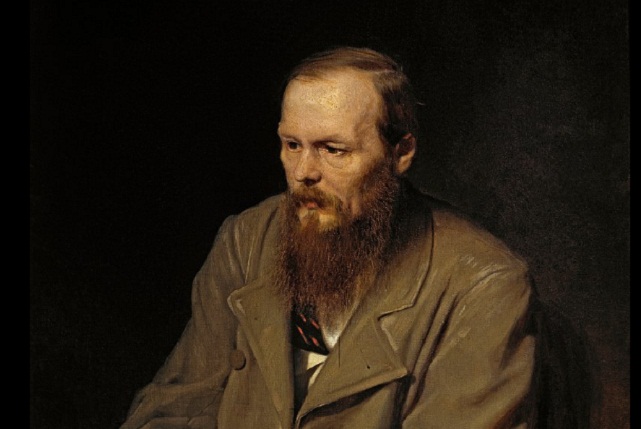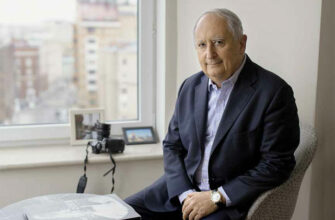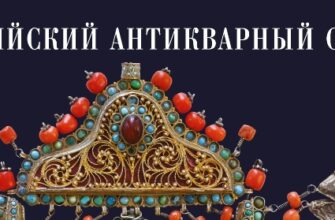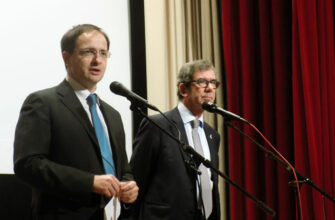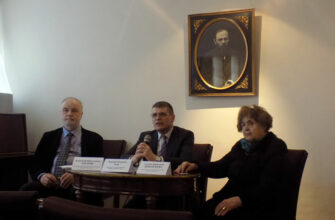On November 11 (or, upon old style on October 30) 1821 was born Russian writer Theodor Mikhailovich Dostoevsky. He came from an impoverished noble family and orphaned early. The writer’s father served as a physician at the hospital for the poor and once he was killed by coachman. Sigmund Freud in «Dostoevsky and parricide» even make a conclusion about the presence of writer’s idee fixe in the form of a guilt complex, which is painfully reflected in his work.
Literary career began with the publication in 1845 of the novel “Poor people”, which has become very popular.
Around the talent of Dostoevsky, such unique and national by identity, debates are not ceased yet. Someone, as V.Nabokov, treat him as a «a third-rate writer» and reproach with «painful form of Christianity» (about the same is seen in late N. Gogol). Some others see him as a prophet, the great social psychologist, master of detective and God knows what else.
I think the divide lies in the Orthodox perspective. Outside the Orthodoxy of Dostoevsky’s genius is simply incomprehensible, and depth of the development the topics of sins (in their ohase development) and confession is also presented as solid moralizing and boredom. The difference of this perception – as if sensing piano from the point of view of wood processing.
In each of his works Dostoevsky traced the path from the source and origin of sin (first of all, sin of pride), later in its development up to the crime, and in confession of the sin by the main characters. The whole chain in concentrated form Fyodor Mikhailovich saw in prison in 1850-1854, where was sent for participation in the freethinking circle of prof. Petrashevsky, and after which he wrote «Notes from House of the Dead». In Siberia Faith of the writer was energized by the wives of the exiled Decembrists, whom he met there and who gifted him the New Testament. Rehabilitation service as a soldier ended with the restoration of a hereditary nobility in 1857.
Dostoevsky wrote about his circle – Russian nobility, caught in a difficult situation after the reform abolishing serfdom. He wrote about his hardships, spiritual Odyssey, errors and insights. Many heroes of his works was found in life. Thus, at the heart of «Crime and Punishment» – the processes of killing creditors by student Danilov and officer Landsberg. At the heart of “Demons” – the killing of a student Petrovskaya agricultural Academy, where studied Dostoevsky’s nephew, by circle of revolutionary Nechaev. Materials of open trial over Nechaev have been carefully studied and used by Dostoevsky in the novel.
Dostoevsky was a public figure, as perhaps all the literary men of the nineteenth century. His beliefs were close to pochvennichestvo (national religious worldview with the belief in a special Messianic role of the Russian people).
The reforms associated with the abolition of serfdom in Russia, have revised many of the basics, including judicial – vowels (open) trial started then. And the writer took active part in it, he went to trials and published his view of them in a broadcast “the Diary of a writer”. The writer managed to save several of the accused from a disproportionately heavy sentence.
Brilliant Russian lawyer of the XIX century A. F. Koni wrote about Dostoevsky as of “great artist who knew how powerfully and deeply to affect the hidden and often silent strings of the heart». Remembering F. M. Dostoevsky, Koni have pointed out the importance of the writer for the humanization of the penal system, and also the talant to find common language with children instantly.
In 1867 the writer married the second time and was happy there. Anna Grigorievna after the writer’s death devoted herself to the care about his legacy and, in addition, left full of love memories. «My good husband not only loved and respected me, as many husbands love and respect their wives, but almost bowed down before me, like I was some special creature», – she sums up the memories of the 14 years of marriage.
F.M. Dostoevsky he died in the Zenith of fame on January 29 (same as A. S. Pushkin) in 1881. Shortly before this, in 1880, in Moscow the opening of the monument to Alexander Pushkin took place, where sounded an impassioned speech by Dostoevsky about Pushkin as the mouthpiece of the Russian spirit, indicating «seclusionist the universality of his genius». It created a furor and added then already a recognized writer popularity as the mouthpiece of an era.
A.F. Koni. Memoires of writers. – Moscow, Pravda, 1989.
V.V. Nabokov. Lectures in Russian Literature. – Moscow, Publisher Nezavisimaya Gazeta, 2001
A.V. Krinitsyn. F.M. Dostoevsky (1821-1881). // Russian literature of XIX-XX centuries…, Filological faculty of MSU, 1998
A.G. Dostoevskaya. Memoires. – Moscow, Pravda, 1994.
